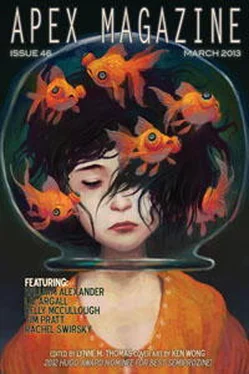Rachel Swirsky - If You Were a Dinosaur, My Love, and Other Stories
Здесь есть возможность читать онлайн «Rachel Swirsky - If You Were a Dinosaur, My Love, and Other Stories» весь текст электронной книги совершенно бесплатно (целиком полную версию без сокращений). В некоторых случаях можно слушать аудио, скачать через торрент в формате fb2 и присутствует краткое содержание. Год выпуска: 2013, Издательство: Apex Magazine, Жанр: nsf, Ужасы и Мистика, short_story, Поэзия, на английском языке. Описание произведения, (предисловие) а так же отзывы посетителей доступны на портале библиотеки ЛибКат.
- Название:If You Were a Dinosaur, My Love, and Other Stories
- Автор:
- Издательство:Apex Magazine
- Жанр:
- Год:2013
- ISBN:нет данных
- Рейтинг книги:3 / 5. Голосов: 1
-
Избранное:Добавить в избранное
- Отзывы:
-
Ваша оценка:
- 60
- 1
- 2
- 3
- 4
- 5
If You Were a Dinosaur, My Love, and Other Stories: краткое содержание, описание и аннотация
Предлагаем к чтению аннотацию, описание, краткое содержание или предисловие (зависит от того, что написал сам автор книги «If You Were a Dinosaur, My Love, and Other Stories»). Если вы не нашли необходимую информацию о книге — напишите в комментариях, мы постараемся отыскать её.
As a paleontologist lies in a coma, his fiancée tells him how things would be different if he were a
.
If You Were a Dinosaur, My Love, and Other Stories — читать онлайн бесплатно полную книгу (весь текст) целиком
Ниже представлен текст книги, разбитый по страницам. Система сохранения места последней прочитанной страницы, позволяет с удобством читать онлайн бесплатно книгу «If You Were a Dinosaur, My Love, and Other Stories», без необходимости каждый раз заново искать на чём Вы остановились. Поставьте закладку, и сможете в любой момент перейти на страницу, на которой закончили чтение.
Интервал:
Закладка:
Rachel Swirsky
IF YOU WERE A DINOSAUR, MY LOVE
and Other Stories

Black, Red, White
On her wedding day
she is red and black and white:
cheeks flushed with desire,
dark hair spilling over bridal gown.
She sits before her mirror,
toasting the best man.
He smiles, tips scarlet tablets
into her ruby wine. “To celebrate,”
he says. He is the huntsman, dark
burning before her wild, confused brain.
Slashes, wails — now, he is dragging her
through black forests of lamp-posts
toward a white-walled hacienda,
skylights shining down on
alabaster vases, cement sculptures,
carpets pale as innocence.
Into her ear he whispers desire
for her secret, inevitable ruby
cut from her chest and stowed
in a box beneath his pillow.
Drugs distort his face:
huntsman, dwarf, neglectful father,
he could be any of the men who’ve trailed
black wounds across her soul.
Her prince was a mirage
dreamed between bloodthirsty men.
This story is red with her own blood.
To live it is to bleed.
He pulls away, drags her
to a bedroom lined with mirrors
glittering colorless
diamond facets like coffin walls.
She hallucinates witches
black in mirrored depths,
cackling at her and her and her and her
in a thousand refractions.
She is fairest of all.
She is white as diamond.
She hitches her wedding gown
and runs into the mirrors
to shatter the coffin
to slip into a tale
of beige and pink
and grey.
Decomposition
PART ONE: LIVING
New Year’s celebrations crashed through the streets of Whitcry in a din of masks and swirling petticoats. Pottery smashed against cobbles, women’s shouts echoed from garrets, men groaned and fought and pissed. Sour smells of alcohol and vomit mingled in chill air. Revelers danced through alleys, tripping over each other’s feet and smashing into walls, laughter constant beneath the chaos.
In its midst, Vare stood solitary and composed, leaning against a small but expensive townhouse. It was the kind of home owned by the kind of man who wanted others to believe that instead of squandering his wealth, he was using his privilege over the poor for some noble purpose, the kind of man who used the phrase “noblesse oblige” without a trace of irony.
The owner was Berrat deLath, known to those who’d fought beside him as Berrat the Just, again without a trace of irony.
Berrat was the scion of a merchant house who, as a young man, had set out to prove that despite his lack of title, he still epitomized the ideal of “nobility.” He’d funded his own division of the church’s army, the Eagles and Hares, and used his own resources to fund the investigation and cleansing of villainous dens where other men flouted church law.
One such den had been a large and prosperous magitorium in the nearby city of Bitterbite which trafficked in the mundane, if illegal, business of charms, as well as darker things. Vare had been a procurer for the magitorium, one of a few hundred men who earned status and riches by supplying the needs of the dozen mages who were too busy casting and carving to gather their own metals and blood.
And what had been the magitorium’s crimes? Child sacrifice, yes, but only rarely. Berrat decried the enslavement of innocents, but what did the church care about such things? They had their own workhouses.
On a bright summer’s day, the Eagles and Hares broke into the magitorium, killed everyone they found inside, pillaged the goods, and left the remains in fire. All the mages died. The only survivors were those in the magitorium’s employee who, by lucky chance, had happened to be away at the time, among them Vare.
In one stroke, Berrat “the Just” had deprived Vare of both his wealth and position, his two most valued possessions. In return, Vare looked forward to depriving Berrat of his. The plan was some ten years in the making.
On this crucial night, Vare wore a red leather half-mask, sculpted into a hawk’s beak. He was certain that no one—not even his adversary—could recognize him bare-faced these days; the past decade had sunken his skin and turned him wan. But caution paid, and Vare was a man of deliberation.
With his ear against the carved limestone and a listening charm beneath his tongue, he tracked the movements of those within the house. During his months-long reconnaissance, he’d kept careful account of how many servants worked in Berrat’s house, along with their usual schedules. A young maid and footman were supposed to stay the night indoors despite the holiday, but Vare was certain their youth would be all the distraction he needed. What young person could resist the call of the revelries outside?
Sure enough, within the hour, he heard the careful footsteps that marked the servants’ departure. His enemy’s house was empty but for the girls upstairs—and soon, for him.
With the aid of a peppery balance charm, he scaled the wall in anonymity as, below, a pair of drunken sluts braced themselves against the wall where he’d been standing. He reached the girls’ balcony, withdrew the key he’d pilfered three days ago from the cook’s spare apron, and slid it silently into the lock. The doors clicked open and he was inside.
Life is a strange balance. Consciousness believes it controls the body, but even when the waking mind is numbed by sleep, the body remembers to salivate and digest and perspire. Its heart beats. It inhales. When exposed to the light, its pupils dilate or contract as appropriate.
Berrat’s girls lay side by side on their single mattress. Pale hands and faces emerged from their blankets. A candle nub burned on a bedside table–no doubt to comfort the girls against night terrors–though, of course, it was only the demons of childhood that could be vanquished with a little light.
Their eyelids fluttered with their dreams. Their chests rose and fell with the steady intake and exhalation of their breaths. Their stomachs churned to finish digesting their holiday desserts; their mouths produced saliva to lubricate their tongues. Their bodies functioned harmoniously, flawlessly. Two perfect girls.
Slipped beneath their tongues, poison charms spelled silent death into their bodies. First the older one, Delira, and then the younger one, Ayl. The older never even woke. The younger gasped and tried to scream, but magic silenced her. She clutched her throat, wide and terrified eyes fixed on Vare. He admired Ayl for the hate in her gaze, but he loved her fear more. It was a delicate and delicious morsel. It was the sweetness of penultimate satisfaction, both delightful in its own right, and thrilling with promise.
Ayl’s struggles weakened, though the hate in her eyes did not. A moment later, she died, and Vare achieved his ultimate satisfaction.
He stood back to admire them. Their cheeks held a rosy bloom even as they grew cold. Ayl’s angry eyes remained open. Delira lay contorted as if caught in a nightmare, dead fingers stretching out for comfort.
Lightly, Vare touched Delira’s lips. He traced delicate curves, soft beneath his fingers. He drew back the blanket and saw the rest of her, all curves and new womanhood. An expensive mix of floral perfumes scented her skin: jasmine and lilac and lavender.
Читать дальшеИнтервал:
Закладка:
Похожие книги на «If You Were a Dinosaur, My Love, and Other Stories»
Представляем Вашему вниманию похожие книги на «If You Were a Dinosaur, My Love, and Other Stories» списком для выбора. Мы отобрали схожую по названию и смыслу литературу в надежде предоставить читателям больше вариантов отыскать новые, интересные, ещё непрочитанные произведения.
Обсуждение, отзывы о книге «If You Were a Dinosaur, My Love, and Other Stories» и просто собственные мнения читателей. Оставьте ваши комментарии, напишите, что Вы думаете о произведении, его смысле или главных героях. Укажите что конкретно понравилось, а что нет, и почему Вы так считаете.












